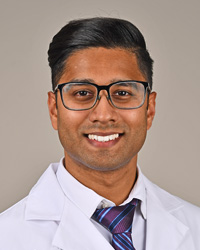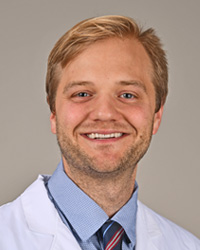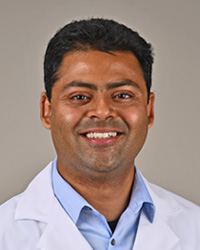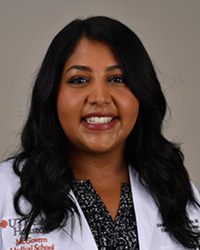Class of 2026 Spotlight
Fellow Spotlight

Tarun Kadaru, MD
Where did you grow up? I was born in Hyderabad, India but moved to the United States when I was very young. I’ve lived on both coasts, in the Midwest, and in the South, but I consider West Des Moines, Iowa to be my hometown and where I spent most of my childhood.
Where did you go for Residency? I completed my residency at UT Southwestern Medical Center in Dallas, TX.
Why did you go into Cardiology? In medicine, I have always loved a little bit of everything. This is what drove me into internal medicine after gradating from medical school – I loved learning how to manage a wide array of pathologies. During my IM training, I had early exposure to cardiology which showed me the broad nature of the specialty. I love that in cardiology, we see patients in the inpatient and outpatient side, take care of critically ill and stable patients, master numerous diagnostic modalities, and perform diagnostic and therapeutic procedures. I’m excited to continue training in cardiovascular diseases and create such a multifaceted career for myself.
What are some strengths of the UTHealth Houston program? My main focus has always been clinical excellence. UTHealth Houston exemplifies clinical management above all else. Throughout the course of fellowship, we are at the bedside seeing patients and managing complex pathologies. There is also a wide exposure to mechanical circulatory support and invasive hemodynamics. I also appreciate the early exposure to echocardiography/cardiac catheterization that allows you to develop essential cardiology skills right from the start.
What are your future career goals after fellowship? I am interested in general cardiology. I want a career that allows me to see patients in the hospital and clinic, perform procedures (such as diagnostic cardiac caths and transesophageal echos), and perform/interpret multimodal diagnostic imaging.
What do you like to do in Houston? I never get tired of the amazing restaurants in Houston as a certified Foodie!

Nicholas King, MD
Where did you grow up? Austin TX
Where did you go for Residency? Vanderbilt University Medical Center
Why did you go into Cardiology? I greatly enjoyed caring for the range of cardiac physiology and pathology with all the non-invasive, invasive, and management modalities available to cardiologists and wanted that for my career.
What are some strengths of the UTHealth Houston program? Broad exposure to cardiovascular medicine, great attendings.
What are your future career goals after fellowship? Likely EP
What do you like to do in Houston? Explore the vibrant food scene.

Daniel McNavish, MD
Where did you grow up? I was born in Pittsburgh, Pennsylvania, but I grew up in Woodstock, Georgia, a suburb outside of Atlanta. When in college, my parents moved to Texas for work, and living in Texas with them opened up a new chapter in my life. I met my wife in Houston, and now I have a daughter that was born in Texas. As they say, “I wasn’t born in Texas, but I got here as fast as I could”
Where did you go for Residency? I did my Internal Medicine training at Wake Forest University School of Medicine in North Carolina.
Why did you go into Cardiology? I was initially pulled into cardiology because taking care of cardiac patients reminded me of my own family members. Heart attacks, heart failure, arrhythmias, heart murmurs, syncope; these symptoms and disease processes permeate all families. Cardiology is such a broad field with a variety of different pathologies and patient populations, with differing levels of acuity, and with a never-ending depth for complexity. One day you can be managing outpatient lipids, the next pouring over a coronary angiogram discussing if treatment of specific lesions would help the patient’s symptoms, and the next you are getting a call from the emergency department for a lethal arrhythmia. Every day in Cardiology is an interesting day.
What are some strengths of the UTHealth Houston program? The UTHealth Houston program is high acuity and high volume while also giving a wide breadth. Memorial Hermann Hospital is a quaternary hospital that accepts complex and difficult medical cases, advanced heart failure requiring advanced therapies, and complex coronary cases. Rotating through MD Anderson Cancer Center gives us experience in a high volume of “bread and butter” cardiology training, including management of arrhythmias, chest pain, syncope, and cardiac-related complications of malignancy and cancer treatment. Finally, rotating through Harris Health System gives us an opportunity for working in the county system and caring for a large portion of the under-insured and uninsured in the Houston area. The UT program has allowed myself to learn cardiology in a myriad of different scenarios, hospitals, and patient populations which I believe is shaping me to be a cardiologist that my patient’s can trust.
What are your future career goals after fellowship? At this time, I am pursuing a career in Non-Invasive Cardiology.
What do you like to do in Houston? Houston is one of the most diverse cities in the country, and with that, my wife and I love the food scene here. There is anything you would want to eat, plus more. On off-days, we explore the museum district, the multiple parks in the city (when the weather permits), and drive 45 minutes to the Galveston beach.

Hina Patel, MD
Where did you grow up? Salisbury, Maryland
Where did you go for residency? George Washington University in D.C.
Why did you go into cardiology? I always felt that cardiology was a field where you can actually make a difference, from preventing cardiovascular disease in the outpatient setting to managing an acute STEMI or heart block in the CCU. It’s the perfect concoction of imaging, procedures, and clinical medicine- you can do so much with your career!
Why did you choose UT? Having spent all my time training/living in the east coast, I was looking to experience something new. On my interview day, it was evident that that this was a strong fellowship program, with supportive leadership and co-fellows.
What are some strengths of UT? There is a wide range of acuity and high volume.
What are your future career goals after fellowship? I am still trying to decide between general cardiology and electrophysiology.
What do you like to do in Houston? I have been to so many great restaurants/bars since moving here! Plus, the warm weather makes for a long pool/park season and I love being outdoors.

Avinash Thangirala, MD
Where did you grow up? Grew up in Austin, TX (and went to UT Austin, Hook ’em!)
Where did you go for Residency? New York University (NYU)
Why did you go into Cardiology? The diversity of cardiology is unparalleled in terms of pathology, patient population, and treatment. I was exposed to cardiology early on during my core undergraduate training at UT in the BME department, whether it was learning about basic physiology and hemodynamics, or designing and prototyping various devices. During residency, there was a certain logical flow that I found even with the clinical aspects of cardiology. The pathophysiology of cardiovascular disease also lends itself to make a profound impact in often a relatively short amount of time. Seeing my patients in residency who could barely walk across a room before feeling short of breath, then educating them about their condition, and then seeing them climb flights of stairs after an intervention and optimal med management made a big impression on me. There’s no shortage of examples such as these in cardiology, especially with ongoing breakthroughs in the field.
What are some strengths of the UTHealth Houston program? I chose UTHealth Houston because of the breadth of clinical exposure and faculty that have a wide range of expertise – whether that’s in MCS, complex interventional, and imaging modalities such as PET. UTHealth is a high-volume training center that gives us a chance to see all aspects of cardiology so that post-fellowship I would be very comfortable practicing independently.
What are your future career goals after fellowship? Plan on interventional or general cardiology. Have additional interests in cloud computing, machine learning, and openEHR/FHIR.
What do you like to do in Houston? The parks in Houston are fantastic – love biking, tennis, and running in Hermann or Memorial. There’s plenty of sporting events and festivals year-round as well as many different cuisines. Also enjoy hanging out with our awesome co-fellows.

Akshitha Yarrabothula, MD
Where did you grow up? I was born in India and moved to California when I was seven. I spent most of my childhood in Memphis, TN.
Where did you go for Residency? I did my residency here at UTHealth Houston.
Why did you go into Cardiology? I liked the clinical range that cardiology offered. In any given week, you can be taking care of critically ill patients in the ICU, performing complex interventions in the Cath Lab, counseling patients in clinic about cardiovascular risk reduction, and interpreting a number of different studies (EKGs, TTEs, stress tests, etc.). For me, cardiology was the perfect combination of critical thinking, procedures, and preventive medicine.
What are some strengths of the UTHealth Houston program? There are many strengths of our program: 1) high clinical volume and diversity of patient cases, 2) perfect balance between autonomy and supervision/guidance, and 3) amazing co-fellows who are some of the nicest and most hardworking people you will ever meet.
What are your future career goals after fellowship? I am interested in interventional cardiology.
What do you like to do in Houston? I like to explore new restaurants and cocktail bars, go on walks around Memorial Hermann Park during the cooler months, and play pickleball/tennis with friends.